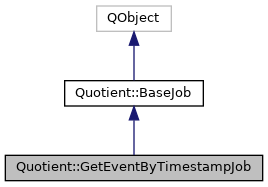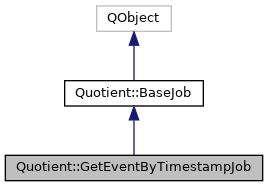 |
libQuotient
A Qt library for building matrix clients
|
 |
libQuotient
A Qt library for building matrix clients
|
Get the closest event ID to the given timestamp. More...
#include <room_event_by_timestamp.h>


Classes | |
| struct | Response |
Public Member Functions | |
| GetEventByTimestampJob (const QString &roomId, int ts, const QString &dir) | |
| QString | eventId () const |
| The ID of the event found. | |
| int | originServerTimestamp () const |
 Public Member Functions inherited from Quotient::BaseJob Public Member Functions inherited from Quotient::BaseJob | |
| BaseJob (HttpVerb verb, const QString &name, QByteArray endpoint, bool needsToken=true) | |
| BaseJob (HttpVerb verb, const QString &name, QByteArray endpoint, const QUrlQuery &query, RequestData &&data={}, bool needsToken=true) | |
| QUrl | requestUrl () const |
| bool | isBackground () const |
| Status | status () const |
| Current status of the job. | |
| QString | statusCaption () const |
| Short human-friendly message on the job status. | |
| QByteArray | rawData (int bytesAtMost) const |
| Get first bytes of the raw response body as received from the server. | |
| const QByteArray & | rawData () const |
| Access the whole response body as received from the server. | |
| QString | rawDataSample (int bytesAtMost=65535) const |
| Get UI-friendly sample of raw data. | |
| QJsonObject | jsonData () const |
| Get the response body as a JSON object. | |
| QJsonArray | jsonItems () const |
| Get the response body as a JSON array. | |
| template<typename T > | |
| T | loadFromJson (auto keyName, T &&defaultValue={}) const |
| Load the property from the JSON response assuming a given C++ type. | |
| template<typename T > | |
| T | takeFromJson (auto key, T &&defaultValue={}) |
| Load the property from the JSON response and delete it from JSON. | |
| int | error () const |
| Error (more generally, status) code. | |
| virtual QString | errorString () const |
| Error-specific message, as returned by the server. | |
| QUrl | errorUrl () const |
| A URL to help/clarify the error, if provided by the server. | |
| JobBackoffStrategy | currentBackoffStrategy () const |
| Get the back-off strategy for this job instance. | |
| void | setBackoffStrategy (JobBackoffStrategy strategy) |
| Set the back-off strategy for this specific job instance. | |
| JobBackoffStrategy::duration_t | getCurrentTimeout () const |
| Q_INVOKABLE Quotient::BaseJob::duration_ms_t | getCurrentTimeoutMs () const |
| JobBackoffStrategy::duration_t | getNextRetryInterval () const |
| Q_INVOKABLE Quotient::BaseJob::duration_ms_t | getNextRetryMs () const |
| std::chrono::milliseconds | timeToRetry () const |
| Q_INVOKABLE Quotient::BaseJob::duration_ms_t | millisToRetry () const |
Static Public Member Functions | |
| static QUrl | makeRequestUrl (const HomeserverData &hsData, const QString &roomId, int ts, const QString &dir) |
| Construct a URL without creating a full-fledged job object. | |
 Static Public Member Functions inherited from Quotient::BaseJob Static Public Member Functions inherited from Quotient::BaseJob | |
| template<typename... StrTs> | |
| static QByteArray | makePath (QByteArrayView base, StrTs &&... parts) |
| static JobBackoffStrategy | defaultBackoffStrategy () |
| Get the default back-off strategy used for any newly created job. | |
| static void | setDefaultBackoffStrategy (JobBackoffStrategy defaultStrategy) |
| Set the default back-off strategy to use for any newly created job. | |
Additional Inherited Members | |
 Public Types inherited from Quotient::BaseJob Public Types inherited from Quotient::BaseJob | |
| enum | StatusCode { Success = 0 , NoError = Success , Pending = 1 , WarningLevel = 20 , UnexpectedResponseType = 21 , UnexpectedResponseTypeWarning = UnexpectedResponseType , Unprepared = 25 , Abandoned = 50 , ErrorLevel = 100 , NetworkError = 101 , Timeout , Unauthorised , ContentAccessError , NotFound , IncorrectRequest , IncorrectResponse , TooManyRequests , RateLimited = TooManyRequests , RequestNotImplemented , UnsupportedRoomVersion , NetworkAuthRequired , UserConsentRequired , CannotLeaveRoom , UserDeactivated , FileError , AccountLocked , UserDefinedError = 256 } |
| Job status codes. More... | |
| using | duration_ms_t = std::chrono::milliseconds::rep |
 Public Slots inherited from Quotient::BaseJob Public Slots inherited from Quotient::BaseJob | |
| void | initiate (Quotient::ConnectionData *connData, bool inBackground) |
| void | abandon () |
| Abandon the result of this job, arrived or unarrived. | |
 Signals inherited from Quotient::BaseJob Signals inherited from Quotient::BaseJob | |
| void | aboutToSendRequest (QNetworkRequest *req) |
| The job is about to send a network request. | |
| void | sentRequest () |
| The job has sent a network request. | |
| void | statusChanged (Quotient::BaseJob::Status newStatus) |
| The job has changed its status. | |
| void | retryScheduled (int nextRetryNumber, Quotient::BaseJob::duration_ms_t inMilliseconds) |
| A retry of the network request is scheduled after the previous request failed. | |
| void | rateLimited () |
| The job has been rate-limited. | |
| void | finished (Quotient::BaseJob *job) |
| The job has finished - either with a result, or abandoned. | |
| void | result (Quotient::BaseJob *job) |
| The job has finished with a result, successful or unsuccessful. | |
| void | success (Quotient::BaseJob *) |
| The job has finished with a successful result. | |
| void | failure (Quotient::BaseJob *) |
| The job has finished with a failure result Emitted together with result() when the job resulted in an error. Mutually exclusive with success(): after result() is emitted, exactly one of success() and failure() will be emitted next. Will not be emitted in case of abandon()ing. | |
| void | downloadProgress (qint64 bytesReceived, qint64 bytesTotal) |
| void | uploadProgress (qint64 bytesSent, qint64 bytesTotal) |
 Protected Types inherited from Quotient::BaseJob Protected Types inherited from Quotient::BaseJob | |
| using | headers_t = QHash< QByteArray, QByteArray > |
 Protected Slots inherited from Quotient::BaseJob Protected Slots inherited from Quotient::BaseJob | |
| void | timeout () |
 Protected Member Functions inherited from Quotient::BaseJob Protected Member Functions inherited from Quotient::BaseJob | |
| QByteArray | apiEndpoint () const |
| void | setApiEndpoint (QByteArray apiEndpoint) |
| const headers_t & | requestHeaders () const |
| void | setRequestHeader (const headers_t::key_type &headerName, const headers_t::mapped_type &headerValue) |
| void | setRequestHeaders (const headers_t &headers) |
| QUrlQuery | query () const |
| void | setRequestQuery (const QUrlQuery &query) |
| const RequestData & | requestData () const |
| void | setRequestData (RequestData &&data) |
| const QByteArrayList & | expectedContentTypes () const |
| void | addExpectedContentType (const QByteArray &contentType) |
| void | setExpectedContentTypes (const QByteArrayList &contentTypes) |
| QStringList | expectedKeys () const |
| void | addExpectedKey (QString key) |
| void | setExpectedKeys (const QStringList &keys) |
| const QNetworkReply * | reply () const |
| QNetworkReply * | reply () |
| virtual void | doPrepare (const ConnectionData *) |
| Prepare the job for execution. | |
| virtual void | onSentRequest (QNetworkReply *) |
| Postprocessing after the network request has been sent. | |
| virtual void | beforeAbandon () |
| virtual Status | checkReply (const QNetworkReply *reply) const |
| Check the pending or received reply for upfront issues. | |
| virtual Status | prepareResult () |
| An extension point for additional reply processing. | |
| virtual Status | prepareError (Status currentStatus) |
| Process details of the error. | |
| QJsonValue | takeValueFromJson (QAnyStringView key) |
| Retrieve a value for one specific key and delete it from the JSON response object. | |
| void | setStatus (Status s) |
| void | setStatus (int code, QString message) |
| void | forceResult (QJsonDocument resultDoc, Status s={ Success }) |
| Force completion of the job for sake of testing. | |
| void | setLoggingCategory (QMessageLogger::CategoryFunction lcf) |
| Set the logging category for the given job instance. | |
| ~BaseJob () override | |
 Static Protected Member Functions inherited from Quotient::BaseJob Static Protected Member Functions inherited from Quotient::BaseJob | |
| static QUrl | makeRequestUrl (const HomeserverData &hsData, const QByteArray &encodedPath, const QUrlQuery &query={}) |
| Construct a URL out of baseUrl, path and query. | |
 Properties inherited from Quotient::BaseJob Properties inherited from Quotient::BaseJob | |
| QUrl | requestUrl |
| int | statusCode |
Get the closest event ID to the given timestamp.
Get the ID of the event closest to the given timestamp, in the direction specified by the dir parameter.
If the server does not have all of the room history and does not have an event suitably close to the requested timestamp, it can use the corresponding federation endpoint to ask other servers for a suitable event.
After calling this endpoint, clients can call `/rooms/{roomId}/context/{eventId}` to obtain a pagination token to retrieve the events around the returned event.
The event returned by this endpoint could be an event that the client cannot render, and so may need to paginate in order to locate an event that it can display, which may end up being outside of the client's suitable range. Clients can employ different strategies to display something reasonable to the user. For example, the client could try paginating in one direction for a while, while looking at the timestamps of the events that it is paginating through, and if it exceeds a certain difference from the target timestamp, it can try paginating in the opposite direction. The client could also simply paginate in one direction and inform the user that the closest event found in that direction is outside of the expected range.
Definition at line 35 of file room_event_by_timestamp.h.
|
explicit |
| roomId | The ID of the room to search |
| ts | The timestamp to search from, as given in milliseconds since the Unix epoch. |
| dir | The direction in which to search. f for forwards, b for backwards. |
|
inline |
The ID of the event found.
Definition at line 58 of file room_event_by_timestamp.h.
|
static |
Construct a URL without creating a full-fledged job object.
This function can be used when a URL for GetEventByTimestampJob is necessary but the job itself isn't.
|
inline |
The event's timestamp, in milliseconds since the Unix epoch. This makes it easy to do a quick comparison to see if the event_id fetched is too far out of range to be useful for your use case.
Definition at line 64 of file room_event_by_timestamp.h.